Waging Peace-1: In Search of the Russian Soul
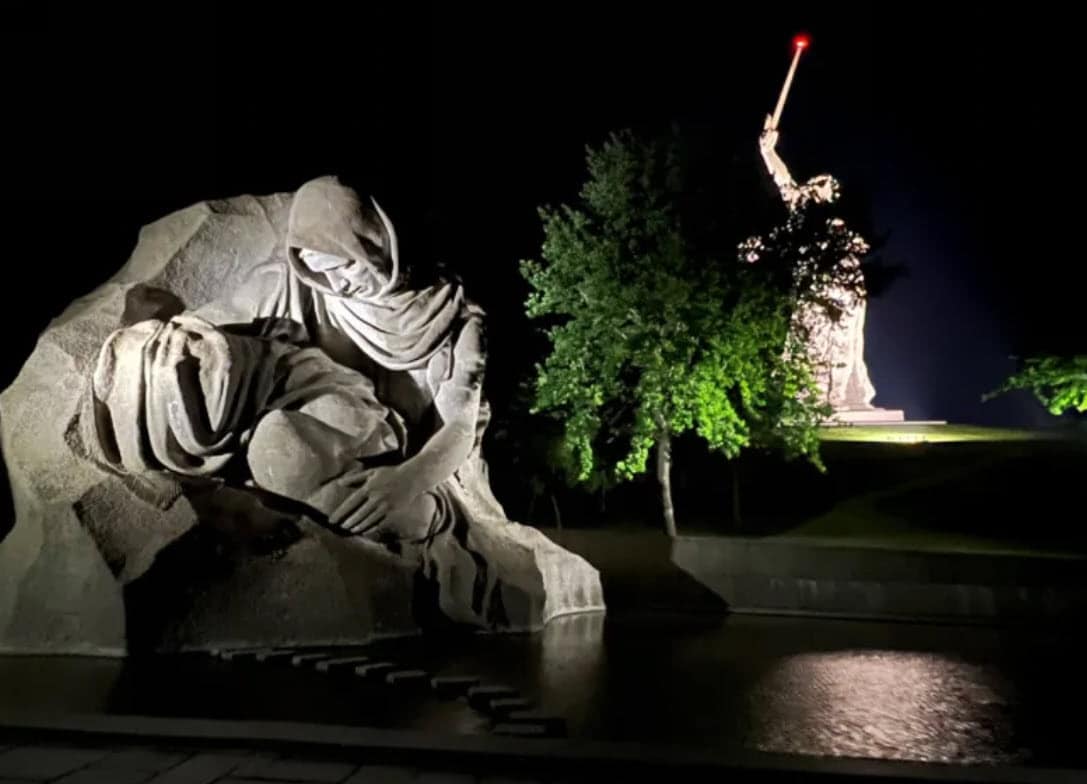
“The Grieving Mother” (foreground), “The Motherland Calls” (background), Mamayev Kurgan, Volgograd
by Scott Ritter [6-2-2023 published].
(Over time I've come to have a lot of respect for Scott Ritter. He has an incredible grasp of things relating to Russia and the political/military tensions between the West & Russia & other parts of the world. I especially like that Scott doesn't buy into the political propaganda and always gives his best frank analysis of current & historical events. This is an amazing story about how Scott was invited to Russia by a private citizen for a 26-day all-expense-paid tour to promote his book and really get in touch with the soul of the Russian people. He is writing a book about this experience that will be turned into a movie for release in the middle of 2024. Notice what happens when both sides decide to honestly understand each other. — RAD)
Introduction: Fellow Travelers
From April 30 through May 25 of 2023, my daughter, Victoria, and I were blessed with the opportunity to visit Russia as part of a 12-city tour to promote my book, Disarmament in the Time of Perestroika. The book had been published in the Russian language by Komsomolskaya Pravda under the title Disarmament Race (apparently the term “perestroika” generates sufficient negative feelings amongst the Russian public to be considered a bad marketing choice for inclusion in the title of a book.)
The tour was, from my perspective, a tremendous success. I was well received at every destination, greeted by receptive audiences, and provided with numerous opportunities to be interviewed by the mainstream television and radio outlets in each city to promote the book. From a marketing perspective, the execution of this trip was flawless. How this translates into sales is a question only the publisher can answer but given the warm smiles on the faces of the Komsomolskaya Pravda representatives at each location, I think the answer was obvious.
I’d like to believe that the quality of the book and the innate charm of its author were the driving forces behind whatever success the Russian language edition enjoys. However, I am under no illusions that the Russian language edition of my book would ever have seen the light of day without the direct and personal involvement of one individual—Alexander Sergeevich Zyrianov.
Alexander is the General Director of the Investment Development Agency of the Novosibirsk Region of the Russian Federation. From what I’ve come to understand, Alexander and his employees straddle a space between Russian government officialdom and the private sector to help facilitate foreign and domestic investment into the economy of the Novosibirsk region. I gather he was quite good at what he does, since under his direction, his agency has helped Novosibirsk build the fastest growing economy in Russia, grounded in foreign investments which have come pouring in despite the combined blows delivered by the Covid pandemic and economic sanctions levied on Russia by the United States and its European and Asian allies in the aftermath of Russia’s military incursion into Ukraine in February 2022.
I’m also smart enough to know that publishing an obscure English-language book about a nearly forgotten time in US-Soviet/Russian relations is not how organizations like Alexander’s achieve such wild economic success. Alexander had originally reached out to me back in July 2022, in a letter “sent in the blind” by his administrative assistant, Alina, to my email address.
“Dear Scott,” the letter read. “With this letter I would like to express my admiration to you and your work, among Russians you are a highly respected expert. I personally watch your speeches with great interest.” Alexander noted that “our visions match in believing that Russia and the USA should not be enemies,” adding that, even though this notion was not the prevalent one defining US-Russian relations at the time, “Russia and the USA should maintain sovereign relations and respect the conduct of foreign policies.”
Then came the zinger: “I am pleased to invite you to visit Russia. All the costs of the visit organization will be covered by me.”
I must admit that at this juncture alarm bells were sounding in my head. Although I no longer served in the military, and whatever information of value I once possessed had long ago lost its relevance and value from an intelligence perspective, the letter read like a classic lure, something too good to be true without significant strings attached, any one of which could derail my credibility as an independent analyst. At first blush, Alexander’s letter looked like a ruse designed to tarnish my reputation for objectivity; in short, a classic case of entrapment.
I discussed this letter with a few colleagues experienced in the world of counterintelligence, and after careful consideration, I sent a response. “Dear Mr. Zyrianov,” I wrote. “I have given a great deal of thought to your invitation and am touched by its sincerity. I would like to start off this letter by saying that it would be a great honor and privilege to visit Russia as your guest, and it is my sincere hope that this will be possible.”
However, I noted, “relations between our two countries is at an all-time low,” and while “I believe we both share a vision for a time when this will not be the case, and we can once again live in an environment of peace and friendship,” unfortunately “this is not the case in the present times, and your kind invitation must be evaluated based upon the present reality.” As such, I declared, “if I were to accept your invitation as is, I could be opening myself up to legal jeopardy here in the United States. This risk is especially high given my current profile in speaking out against the policies of my government as they regard Russia.”
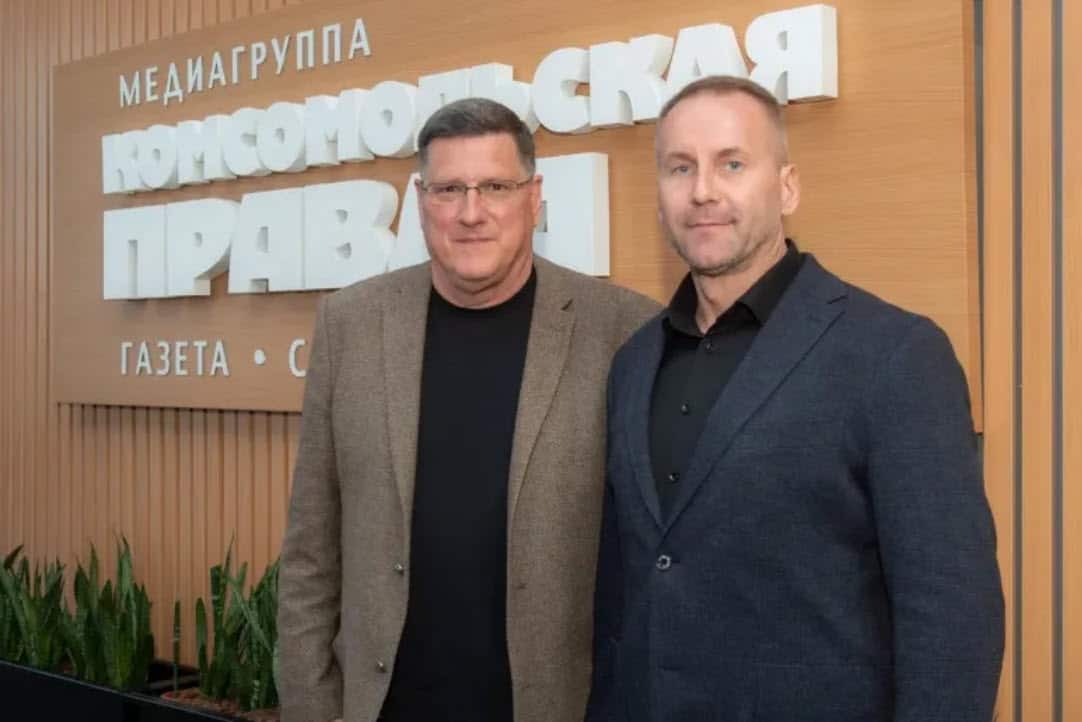
Author (left), Alexander Zyrianov (right), Komsomolskaya Pravda Headquarters, Moscow
Then I threw in my own twist: “There may be a way to make this work,” I noted. If, I suggested, I were to travel to Russia “as part of an official book tour, during which time I participated in events where I promoted my most recent book as well as improved US-Russian relations, then I would not be exposing myself legally.” There was, I believed, “a viable market for a Russian-language version” of my book, “especially if it were marketed to include a speaking tour by the author.”
Responsibility for finding a Russian publisher, however, would have to be assumed by Alexander. “This normally is the responsibility of my publisher, Clarity Press,” I noted, “who has indicated that it is difficult to find a Russian publisher.” If Alexander had any recommendations, I would be more than happy to receive them.
As a final “hurdle,” I threw a monkey wrench into the mix. “I am a father of twin daughters,” I wrote, “and I would be loath to pass up the opportunity for them to join me on such a trip if it were possible.” There is, I added, “no better way to build a bridge for peace than to invite the next generation to help in its construction.”
And, I thought to myself, there is no better way to clip a potential provocation in the wings than by upping the stakes.
Within a week, Alexander responded—he said he was going to make it happen.
And he did.
Alexander did not know me from Adam. Yes, he watched my YouTube interviews, and he read my articles. But a modicum of basic research on the internet would have generated enough controversial search results to send most people running for cover, especially in a conservative society such as Russia. It is one thing if you are taking a gamble with house money, so to speak, where the consequences of failure—financial and reputational—will be born by/shared with others. But when Alexander said that all costs associated with this trip would be paid by him alone, he meant it.
Alexander never spoke of how he financed this trip (and it wasn’t an inexpensive affair). Moreover, it wasn’t my place to ask. I was able to piece enough tidbits of information together to ascertain that he had to sell off significant personal assets to make this trip a reality. This trip was not being done for financial profit or personal gain. From Alexander’s perspective, he was investing in an idea, a principle. There were no guarantees that I would either perform satisfactorily while in Russia or be received well by the Russian people. If the tour failed on either front (or both), Alexander would be left holding an empty bag.
But Alexander had faith, and as I have come to understand, in Russia faith is everything. Alexander, in many ways, defines the Russian ideal—a man of vision, substance, initiative, courage, and integrity. No one asked him to undertake this task—he took it upon himself, the kind of personal initiative many in the West believes is impossible in today’s Russia.
Alexander proved such thinking to be, simply put, just plain wrong.
I was able to garner a little bit about Alexander’s biography. I learned that his grandfather was a hero of the Great Patriotic War, a veteran of SMERSH, the counterintelligence arm of the NKVD, or Soviet Secret Police. He carried out numerous raids deep into the rear area of the German army and was severely wounded as a result. Alexander’s grandfather played a major role in raising Alexander, and his influence can be seen in everything Alexander does to this day.
I know that Alexander was a powerlifter and participated in competitive kickboxing, before being sidelined with a serious back injury. As for his professional life, he has an educational background in economics. Alexander told me that he once worked for the Vector Institute, also known as the State Research Center of Virology and Biotechnology VECTOR, a highly secretive biological research facility which, during Soviet times, was the heart of the Soviet Union’s biological warfare program. He insinuated that he had served in a security capacity which, given the nature of the facility (it is guarded by a regiment of Russian interior troops), has obvious professional implications.
But I took my guidance from the American southern rock band, Lynyrd Skynyrd, who famously sang “Don’t ask me no questions, and I won't tell you no lies.” I didn’t dig into Alexander’s past, and he didn’t probe into mine. We were looking forward, not backward, where trust was everything. I trusted him with the life of my daughter, and he trusted me to be an honest ambassador of the American people. Neither one of us was disappointed.
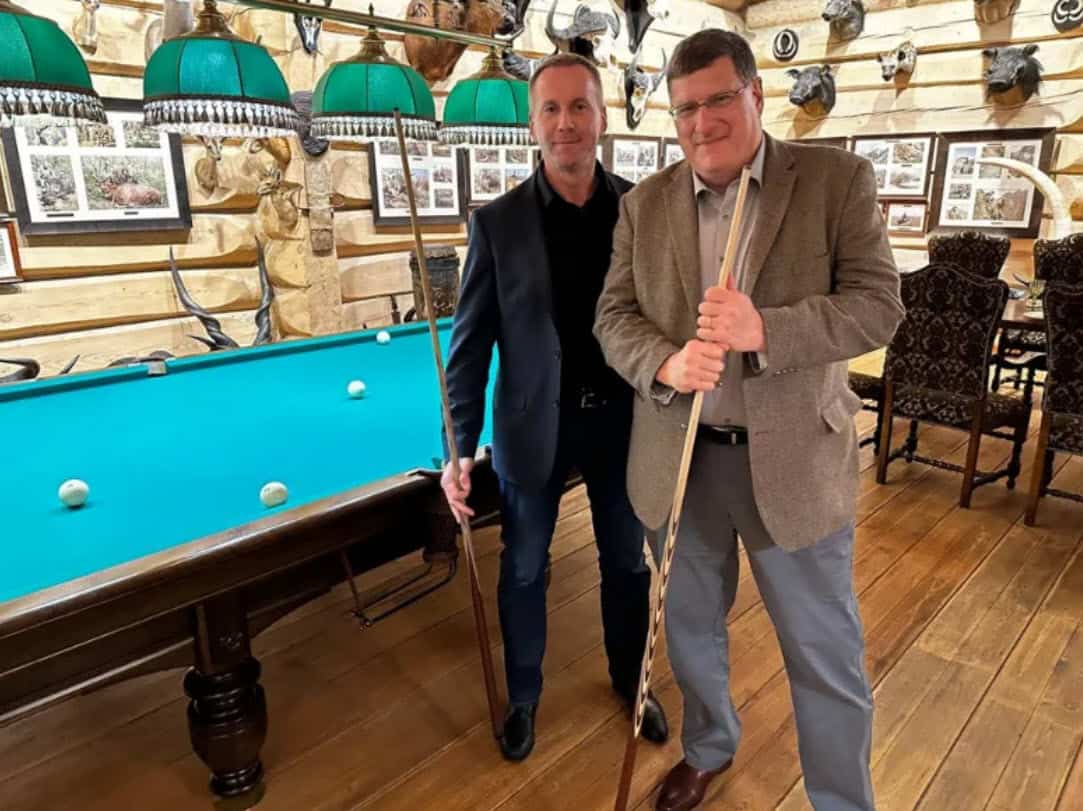
Alexander Zyrianov (left) and the Author (right), playing billiards at the Na Dache Resort, Novosibirsk
Alexander and I coordinated extensively on bringing the publishing aspects of this adventure to closure (getting a book contract done is harder than it sounds, especially given the tight timelines and distances involved, the existence of differing legal and procedural issues, and the fact that the contract was being drawn up in two languages.) We also communicated on the logistics of the trip, including visa matters, ticketing, and the actual itinerary and schedule of the proposed tour.
We did not directly coordinate, however, on the secondary objective of the visit—my personal journey of discovery regarding the “soul” of the Russian nation. I never articulated this aspect of the proposed trip to Alexander. However, by watching the various podcasts I did in the leadup to the visit, Alexander was able to discern my intent. When I indicated that I would be interested in capturing my experiences in Russia for use in a possible documentary film, Alexander arranged for a cameraman to be present at every phase of the visit.
Through these preparations, Alexander and I were constructing a framework around which the proposed visit would unfold, populating the calendar with events and excursions, all of which were designed to expose me to as much of Russia—and the Russian soul—as possible. As a Russian, Alexander was cognizant of just how difficult it was to put your finger on the very essence of what defined the Russian “soul”—like many ethereal subjects, you knew it when you saw it.
Alexander claims to have seen a bit of the Russian “soul” inside me during several of my podcasts but was at a loss to explain just what he meant. One of the main obstacles confronting Alexander and I when it came to communication was that his English was poor at best, and my Russian was worse. To get around this, Alexander enlisted the assistance of Ilya Valkov, the brother of his personal assistant, Alina. Ilya had lived in the United States for a few years, and had studied in London, and he and Alexander had a history of working together professionally and as friends.
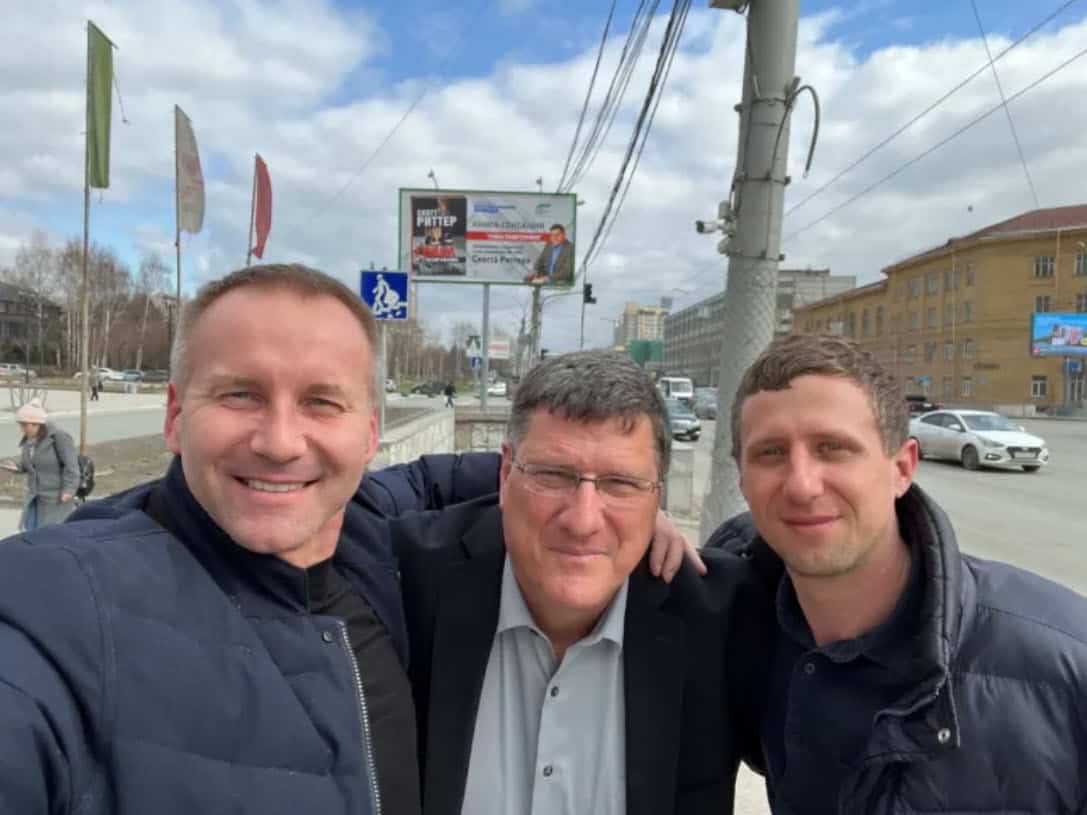
The Author (center) flanked by Alexander Zyrianov (left) and Ilya Valkov (right), in Novosibirsk.
Ilya’s job description was as imprecise as it was broad—he was to simultaneously serve as Alexander’s voice in communicating with Victoria and I about every aspect of our journey, an impossible task given the myriad of nuances and the reality of constant changes, as well as be our primary interface with Russian society. Victoria and I quickly realized that we were prisoners to whatever schedule Alexander put before us, simplifying the lives of all involved, including Ilya, who went from performing the duties of a classic translator to instead becoming our interpreter of the Russian Soul.
One cannot say enough about the important role Ilya played in breathing life into a trip which, if one wasn’t careful, could have devolved into a lifeless experience of simply trying to adhere to a schedule. Everywhere we went, Ilya brought his positive outlook on life. During a fantastic expedition to Lake Baikal, where our Russian hosts took us out on the frozen waters using a hovercraft, allowing us to picnic on the pristine shores of the world’s largest freshwater lake, Ilya would breathe in the air. “This is Russia,” he would say, his eyes closed.
He meant it. And he was right.
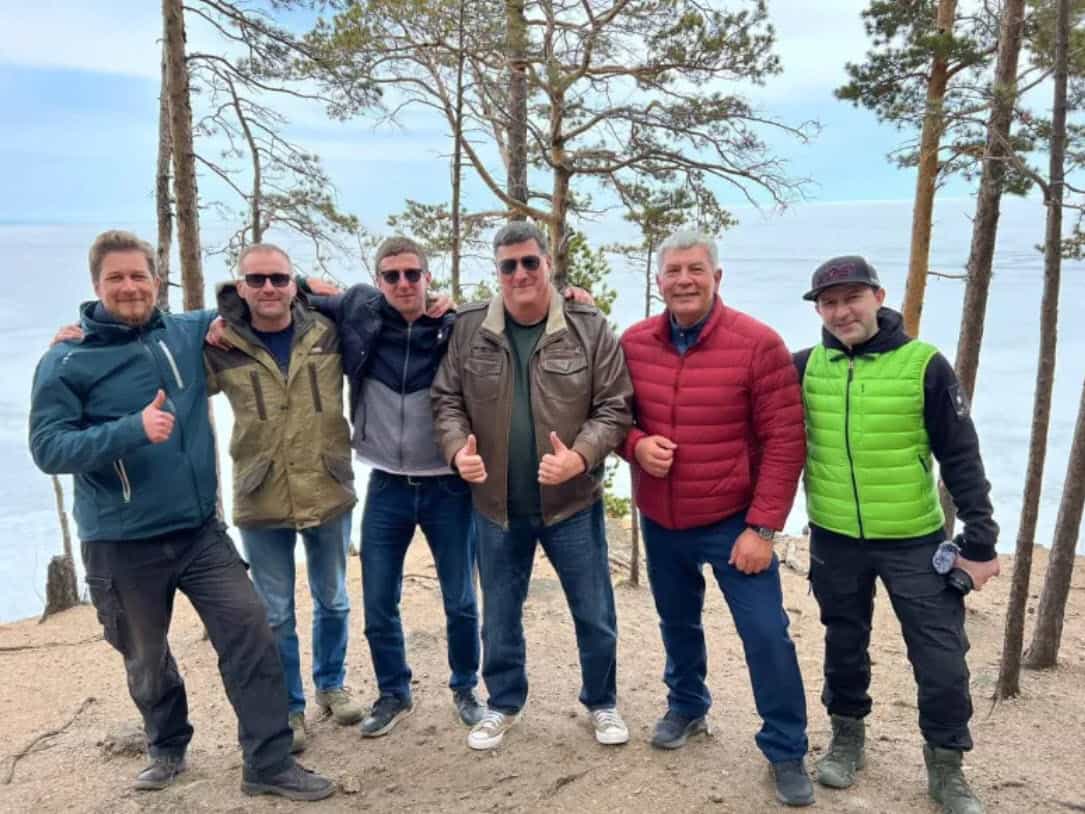
Alexander Zyrianov (second from left), Ilya Valkov (third from left), and the Author (center), Lake Baikal.
Ilya watched my every move, not because he was concerned about any potential security threat I might pose, but rather from the perspective of someone trying to ascertain my every emotional response to the reality of Russia. In Volgograd, during a visit to Mamayev Kurgan, home to the giant statue, The Motherland Calls, I could feel Ilya’s eyes boring into me as I took in the grandeur of the monument, and the crushing reality it represented. Later, when we reached the base of the hillock that simultaneously served as a base for the statue and a grave for the remains of more than 35,000 Soviet soldiers who died defending Mamayev Kurgan from the German invaders, Ilya noticed that I spent a considerable amount of time comparing the monument of “The Grieving Mother” with “The Motherland Calls,” juxtaposing the seemingly contradictory postures of the Motherland calling its sons to battle, and mourning their sacrifice in battle.
Later, Ilya told me a story about a Russian mother, and the love she poured into raising her children. As the children grow older and stronger, the mother diminishes because, as Ilya said, the mother puts her very essence, both spiritual and physical, into their lives. “It’s the ultimate tragedy of war,” Ilya said, “when a mother buries her son. Because part of her that cannot be recovered goes to the grave with him, never to be passed on to the next generation. That’s why the Great Patriotic War means so much to us, even to this day. We lost so much that can never be reclaimed. That’s why a mother’s grief is so strong. It is also why a mother’s call to defend the Russian homeland resonates so powerfully.”
We left Volgograd the next day. On the road leading out of Volgograd, past the factories and urban sprawl, one is quickly confronted by the vastness of the Don Steppe, a seemingly endless expanse of wheat and rye stretching on as far as the eye could see. This was the start of the “automobile” portion of our “planes, trains, and automobiles” adventure, consisting of long drives from Volgograd to Grozny, Grozny to Sevastopol, and Sevastopol to Sochi. The use of the automobile as a mode of transportation was derived from the reality of air travel during wartime—while airliners flew from regional airports, their schedules could be haphazard and fickle. Moreover, there were no flights into Crimea. We were on a tight timetable, and Alexaander believed driving would not only guarantee adherence to this schedule, but also afford Victoria and I an opportunity to see Russia at eye-level.
With Alexander at the wheel, Ilya assumed the role of co-pilot, which meant, in simple terms, he was responsible for the music that would be playing while Alex drove. Victoria and I found ourselves regaled with Russian popular songs, including many popular with Russian soldiers serving in the Donbas. About an hour into the ride, a song began to play—a lively tune, sung to the accompaniment of a traditional Russian button accordion. Both Alex and Ilya sang along, and after a few versus, Ilya looked at Vicka and I over his shoulder. “This song,” he said, a smile on his face, “is about the real Russia. This song is about the Russian Soul.”
Ilya looked down at his ubiquitous smart phone, worked the screen, and soon a text appeared on my phone. “The lyrics,” he said. “Read them. This is Russia.”
The song was “The Combiners,” an ode to the hard men who harvested the crops that fed Russia (and the world) from the seats of giant combine machines. It was sung by Igor Rasteryaev, a Saint Petersburg-born artist who spent his summers in the villages of the Volgograd region, working side by side with the men of whose experiences he sang.
Faraway from big cities,
Where there are no glam boutiques around,
Where the other people live around,
Songs about them aren’t sung.
Serials about them aren’t made,
So they’re not fit for TV channels,
Internet ignores them,
It seems that they don’t exist.
They are young but not students,
They don’t know “Okay” or “Lenta” [Note: two popular Russian food market chains found in large urban areas],
They have never been to sushi bars,
They don’t tan in solariums.
They don’t have expensive things,
They don’t care a hang about emo,
They don't use “Vkontakte” [Note: Russian Facebook], online,
They work hard on harvesters.
Drunk C2H5OH [Note: the chemical composition of ethanol, or Russian moonshine],
Got in “NIVA ROSTSELMASH”,
In DT, Don 500, T-150 [Note: all names of Russian-manufactured combine harvesters],
Pigs had been fed before.
The son’s gone to plough earth, to thresh barley,
His workday will be long, a long-long-long day,
But he knows each screw inside of his tractor,
His pay is 100 dollars a month.
Combiners!
Victoria and I had spent some time in both Saint Petersburg and Moscow, and as such were familiar with the face of modern Russia—the high fashion, fine dining, and all the conveniences that technology and wealth could offer. While shopping in GUM or TsUM (two fashionable Moscow shopping malls), strolling alongside well-heeled Muscovites in the magnificent Moscow Metro and the fashionable boulevards of the Russian capitol, or taking in the sights and sounds of the Russian nightlife from a restaurant perched on the upper floor of a modern Moscow skyscraper, one could easily become enamored with a false sense of belonging, as if all the wealth surrounding you was the very embodiment of the modern Russian nation.
But just as American artists sing about the less-than glamorous aspects of the American working class, so, too, do Russian artists like Igor Rasteryaev capture the Russian rural reality—the unglamorous, sweat-filled world of hard labor that makes everything in Moscow and Saint Petersburg possible.
(Less one thinks that Rasteryaev glorifies irresponsible drinking habits, the teetotaler has also written a poignant song, “Romashki (Daisies)”, in which he mourns the deaths of two village boys who perished from alcohol abuse. “So there’ll be no homes or jobs,” Igor sings, “so that there’ll be bottles and shots, so that instead of Vasya and Roma, only cornflowers and daisies will grow.”)
The Russian Soul, like everything human, has its deeply troubling facets, often hidden away behind bravado and cheer. But to know the Russian Soul, one must confront it in its totality—the good and the bad, the beautiful and the ugly. Artists like Igor Rasteryaev help bring the Russian Soul, in all its glorious imperfection, into focus, and I am grateful to Ilya Valkov, my personal guide to the secrets of the Russian Soul, for introducing me to Rasteryaev’s talent, and the side of Russia his music celebrates.
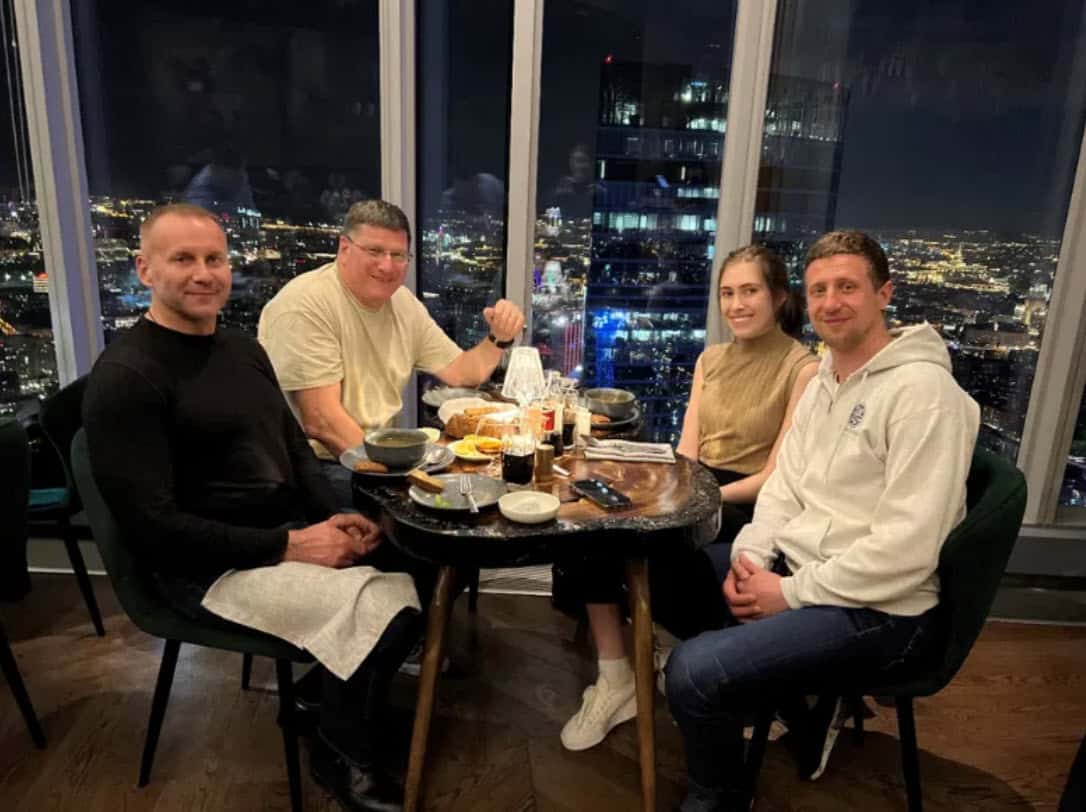
Alexander Zyrianov, the Author, Vicka Ritter, and Ilya Valkov at the Ruski Restaurant, Moscow
As much as I enjoyed and appreciated Ilya’s Guide to the Russian Soul, it sometimes occurred to me that rather than serving in the role of an experienced ship’s captain, navigating me through the intricate reefs and shoals of Mother Russia, Ilya had found himself on this journey operating without a road map, letting the experience define itself as it played out. Often, I would come out of a discussion or interview to find Ilya standing in front of me, tears in his eyes. He would then envelope me with his lanky arms. “Thank you,” he’d say, his voice full of emotion. “You know the Russian Soul so well.”
I was confused because I knew I did not.
But the truth is none of us know the Russian Soul in its entirety, at least not in a way that can be articulated definitively in text or word. Ilya knows this truth, and I soon discovered it. But the fact is that this is something that has been known to all Russians throughout their turbulent history—that the Russian Soul is ever changing, yet ever constant.
Alexander Pushkin, the famous Russian poet, captured this aspect of Russian reality in the following poem:
Is Rus’ strong?
War and pestilence
And rebellion, and external storms pressure
She, raging, shocked—
Look, it’s worth everything!
Everything. That is the value of Russia, even at its worst, to all Russians.
Everything.
The simplicity of the emotion behind such a belief was captured by another great Russia writer, Ivan Turgenev, who observed that “A real Russian has a heart from a child.”
It was there, in Turgenev’s words, I found the key to discerning that which defined the Russian Soul.
I was trying to comprehend the incomprehensible, using the jaded, hardened heart of an adult grown weary from the many harsh lessons life had taught me. Turgenev’s words, however, harkened to the scripture, and in particular Mark 10:15: “Assuredly, I say to you, whoever does not receive the kingdom of God as a little child will by no means enter it.”
The Russian Soul, it seems, is like the kingdom of God—indecipherable to those who have hardened themselves with the callousness of a life lived as an adult, abandoning the faith a child has in life’s potential in favor of the false certainty that experience provides.
Seen from the cynical perspective of an adult, attuned to all things negative, Russia appears as a cacophony of chaos and suffering, a wasteland where souls go to die, never to be reborn.
But with the faith of a child—the heart of a child—Russia is transformed into a land full of promise, full of hope and light, the preservation of which matters more to a Russian than anything else—more than life itself.
If you understand this, then you have the possibility of understanding the soul of Russia.
Midway on the road from Volgograd to Grozny, Ilya shared with me a poem written by Fyodor Tyutchev, a 19th century Russian poet and diplomat. “This will help you better understand the Russian Soul,” he said.
Who would grasp Russia with the mind?
For her no yardstick was created:
Her soul is of a special kind,
By faith alone appreciated.
By faith alone.
Thank you, Ilya Valkov, for being the best possible guide for discovering the key to understanding the Russian Soul.
Thank you, Alexander Zyrionov, for having the courage of conviction and the perseverance of a patriot to turn your vision of creating a forum capable of fostering a deeper understanding between Americans and Russians alike of our shared humanity and, in doing so, helping build a foundation of mutual trust that could foster better relations between our two nations.
From April 30 through May 25, 2023, my daughter, Victoria, and I traveled the width and breadth of Russia on a journey of discovery. We did not make this trip alone, but rather were joined by the best travel companions anyone could ever hope for.
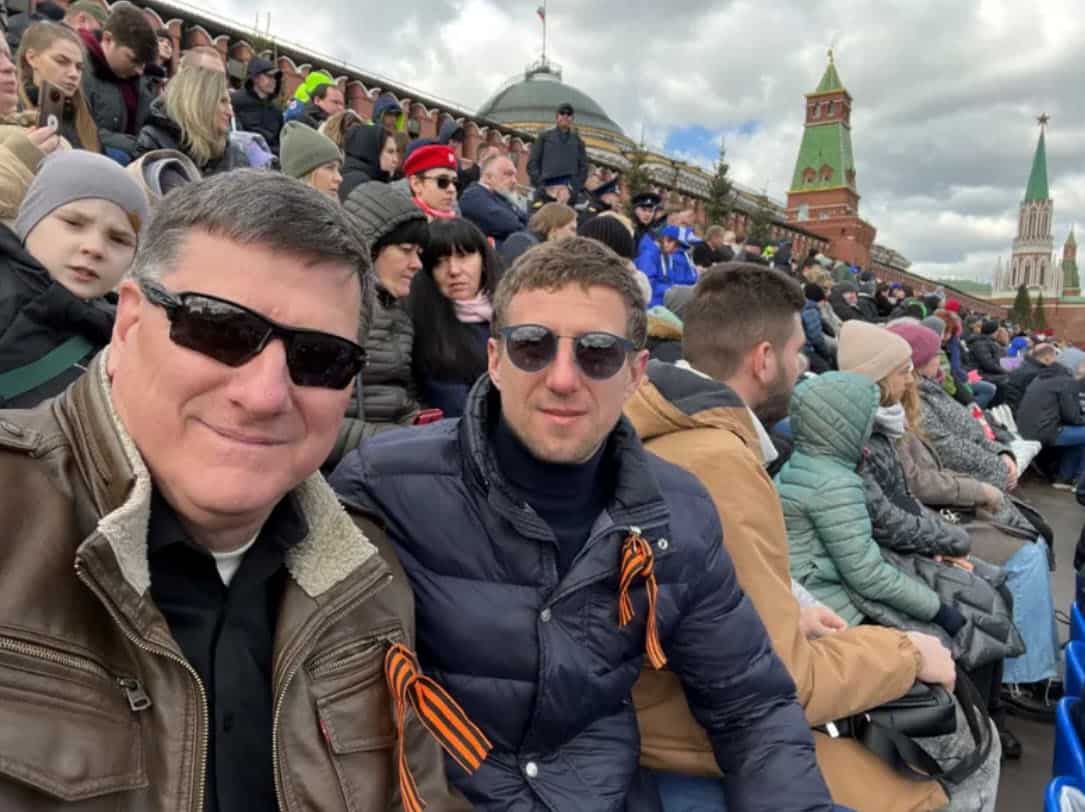
The Author (left) and Ilya ValTkov (right), Red Square, Moscow.
But Alexander and Ilya were, and are, more than travel companions.
They are friends.
They are family.
And they embody everything one could hope for while undertaking a journey of the scope and scale of that which occurred during this 26-day, 12-city adventure.
Waging Peace is the story of this journey. Of our discoveries. Of our friendship.
May it serve as a template for future discoveries by other Americans and Russians going forward.
However, before embracing the various narratives that comprise this journey, I would ask the reader to pause and free themselves of the encumbrances of their respective life experiences that weigh in on their thinking and analysis.
Waging Peace is a journey of discovery, the goal of which is to better understand the Russian Soul.
And to do that one must have the heart and faith of a child.
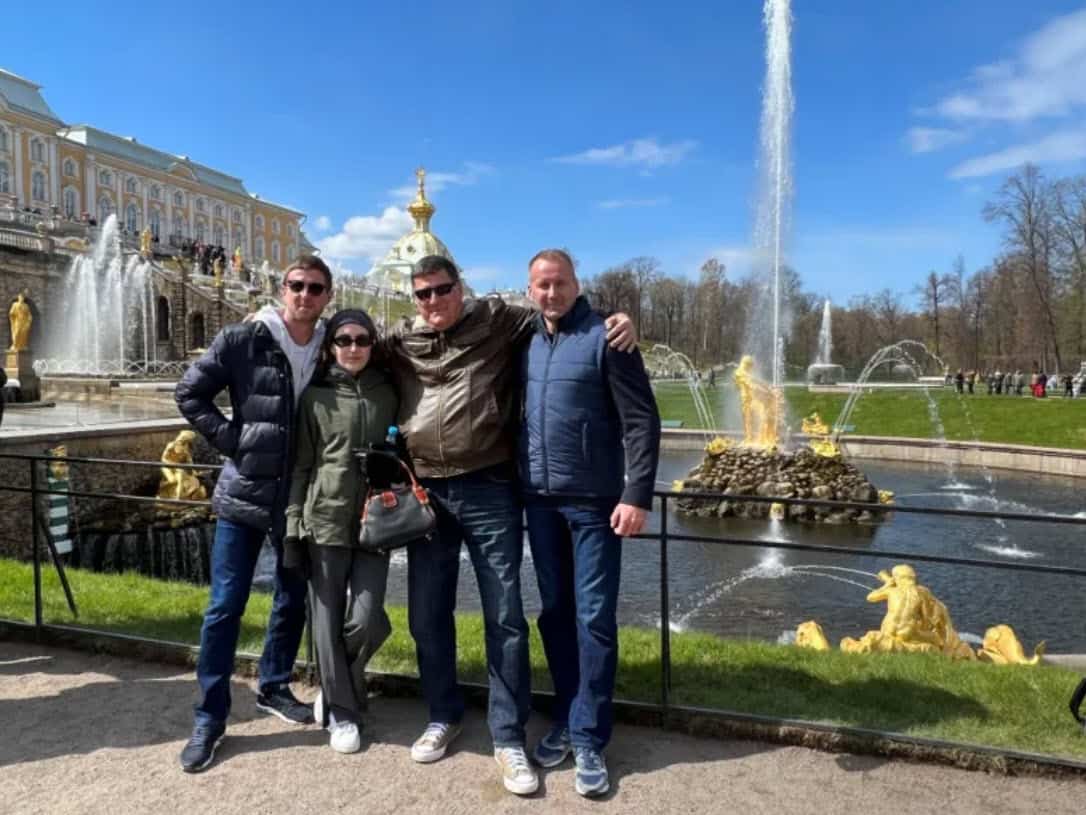
(Note: This is the first installment in what will be more than a dozen articles about my 26-day visit to Russia, and the lessons I learned as a result. If you enjoyed this series and would like to see more content such as this, please sign up for a paid subscription or provide a donation, so that the author will be able to dedicate the time and energy necessary to continue producing quality content that embodies his motto, “Knowledge is Power”, and helps overcome the ignorance of Russophobia that infects the West today.)
